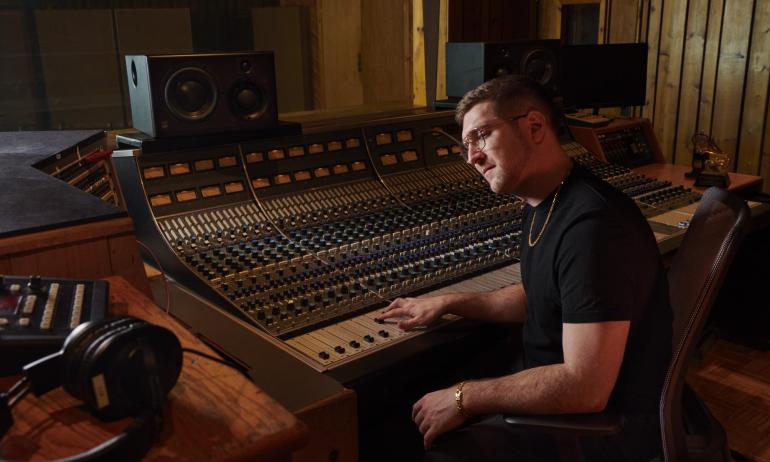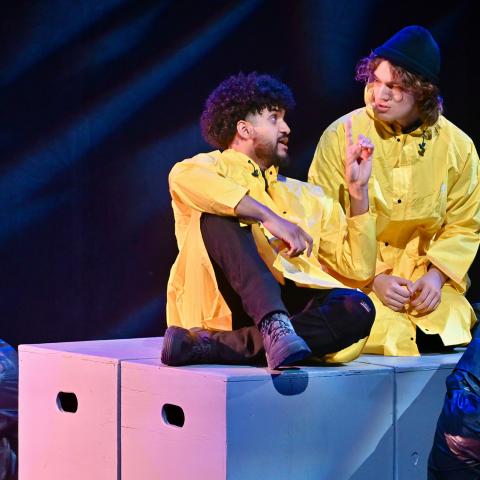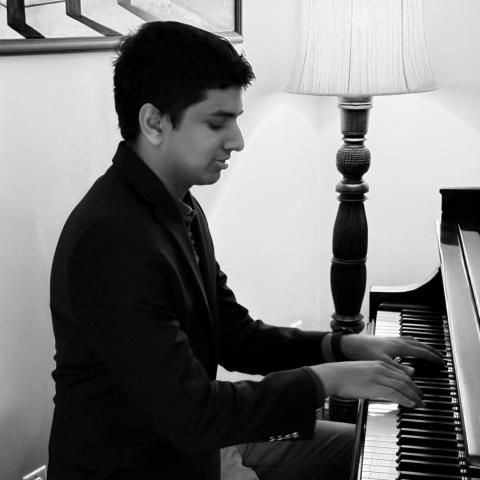Overwatch Composer Adam Burgess Charts a Path from Berklee to Blizzard Entertainment
Adam Burgess B.M. '14 in studio at Blizzard Entertainment.
Image courtesy of artist
A few years after graduating from Berklee with a degree in contemporary writing and production, Newcastle, Australia, native Adam Burgess B.M. '14 spends his days making music heard by millions of gamers worldwide. Now based in Orange County, California, Burgess is a composer for Blizzard Entertainment, where he writes music for the massively popular video game franchise Overwatch, which as of late 2019 boasted a player base of 50 million. Below, Burgess answers our questions about his journey from Berklee to Blizzard, the challenges and techniques involved in scoring a game like Overwatch, and some tips for aspiring video game composers.
Could you talk a bit about your path from Berklee to Blizzard? How did you find your way into video game scoring?
After graduating Berklee in 2014, I spent the best part of a year in Los Angeles. I worked multiple jobs and internships throughout my time there, many simultaneously. It was by far the busiest time of my life.
I began working for Icelandic composer Ólafur Arnalds doing music transcriptions, score preparation, and some light re-orchestration work for one of his concert tours. I cold-emailed him as a fan, and attached a transcription that I had taken down and engraved. This led to my first work out of college. I worked with Lucas Vidal [B.M. '07], taking score notes from a remote session in Budapest, and was referred from there to Benjamin Wallfisch at Remote Control Productions, where I worked as a mix assistant on two feature films. I interned for Fil Eisler on the television shows Revenge and Empire. My internship with Fil was invaluable to my growth as a composer, as there were often multiple orchestral sessions per week that I had to work. I was able to observe how a successful session was run, as well as deepen my knowledge of orchestration through spending hours every week observing how a professional orchestra works.
Every project is a collaboration, and I have found that if you do good work, treat people with respect, and nurture your relationships, they will want to work with you again.
—Adam Burgess B.M. '14
All of these experiences were different, and while I was never able to touch a piano/keyboard or compose a note of music the entire time, all of them gave me the appropriate surrounding skills that I needed to apply at Blizzard. When I started at Blizzard, I was working as a composer's assistant for Derek Duke, who is now our music director. I learned, and continue to learn, so much from him. I was lucky to take on composition tasks fairly early on, and was promoted to a full time in-house composer position at the company a couple of years ago.
How would you describe Overwatch to someone who has never played it?
Overwatch is a fast-paced six-player-versus-six-player team-based shooter game. It features 31 unique heroes, each bringing their own incredible powers and game-changing ultimate abilities into battle on objective-based maps set across the world. Players can switch heroes mid-match to adapt to the ever-changing situation on the field—but victory will best be achieved when heroes combine their powers and act as a unified team.
The world of Overwatch is bright, colorful, positive, and full of hope. It is important to us that the music reflects that. We are always looking to put a hopeful and uplifting spin on everything that we do.
Adam Burgess at work on an 'Overwatch' cue.
How do you go about composing music for a game that's so dynamic and free-form?
The music of Overwatch is a team effort from composers within and outside of the company. We all have our different processes, but we all rally around the same ideals when creating music for the franchise. We work side by side with the game team during development. This is unlike film, where a composer would typically come on board towards the end of the process. Because of this, I personally work extensively with concept art while the game is being developed to make sure that the music is fitting the aesthetic and overall vision of the game. Blizzard is a very iterative and collaborative studio, so we always make sure to put music into the build early enough to be tested by the game team and iterate accordingly.
There is so much that can shape the way the music sounds, from the story, the location, and the visual style to the character and everything in between. Many decisions are based around what game mode the music is being composed for, how that mode functions, and what role music should play in supporting that mode. For example, sometimes we will have to compose for a new world location, and it’s our job to compose a piece that helps to transport and immerse the player in the world when they first load the map. Other times, we may be composing for a story mission. This requires the music to support the main story beats throughout, and the music is often born from a more emotional response to the story. Another task is composing for our competitive game modes. It is our job to provide vital gameplay cues, while also showing restraint, to ensure that players can hear all of the vital sound design that could give them a competitive edge. It really keeps our work interesting to have so many variables within one title.
Can you describe the process behind a particular cue you worked on?
Overwatch is interesting in that most of our maps take place in real-world locations with real musical cultures and traditions. We have to research and listen to a lot of music from that region, and then find the appropriate balance between the core sound of the Overwatch franchise and the regional flavor. I remember the music for Paris being incredibly difficult because I became enamored with French music. I was making the music overly traditional to the point that it didn’t sound like Overwatch anymore. It was a struggle to find the right balance, and it took more time than any other map I had worked on. The process of course-correcting myself was to limit myself to only electronics and percussion. Once I had a solid foundation that sounded like Overwatch using less traditional instrumentation, I built the piece from there. I typically start with a piano sketch or melodic idea, but sometimes finding the way ahead requires you to totally shift your approach.
In contrast, I was recently able to score a section of the "Zero Hour”* cinematic that announced Overwatch 2. It is the middle sequence where, one by one, all of the heroes show up in Paris. It is the climactic scene of the cinematic, and it was important to get this scene correct early on. I spent a couple of days writing a temporary pass of the music to storyboards. Many months later, when final animation was complete and production was wrapping up, it only needed a small music edit and a two-bar extension to have it approved. It nearly fit seamlessly, and it was significantly more minutes of music than Paris ever was.
Every cue is different and it can be very hard to plan for. The creative process is fluid and when it’s hard going, I sometimes wish there was a magical formula for it. At the same time, that’s half the fun.
Watch the Overwatch 2 "Zero Hour" cinematic, featuring music by Adam Burgess:
*A note about "Zero Hour": This cinematic was a collaboration with Neal Acree, who scored the front and back of the cinematic.
What excites you most about the process of composing for video games?
I love the unpredictability and unknown of video game scoring. Ideas that may seem crazy for another medium can be totally fair game when it comes to game development. Overwatch has a singing omnic [robot] in a cabaret club, an interactive karaoke room where your character will sing to the backing music, and a DJ who uses two different songs to heal or speed up his teammates. All of these things have to pass through the music department, and you never know what request will come next. Every day presents exciting new challenges, and updates in technology allow us to constantly be learning and finding creative ways to solve problems.
Most of all, this is a young and rapidly growing industry. We are only on the cusp of what video games and the technology surrounding it will be able to do in the future. This is really exciting to me.
I love the unpredictability and unknown of video game scoring. Ideas that may seem crazy for another medium can be totally fair game when it comes to game development.
—Adam Burgess B.M. '14
Were there particular lessons you took from your time at Berklee that have been especially useful in the work you’re doing now?
One of my fondest memories to this day is studying with Joe Carrier [an associate professor in the Contemporary Writing and Production Department]. He instilled a sense of discipline and "never settling" in me that I will forever be grateful for. I worked on my graduation portfolio with Joe, and he constantly pushed me to better myself every single week. He taught me the importance in every tiny detail, and how every small note and production choice counts and affects the overall picture. When I left Boston, I saw that value reflected in every person successfully working in the industry.
Many of my best friends are from Berklee, and it is exciting to see their careers grow and develop over these last few years. Many were instrumental in my career when I arrived in L.A. At Blizzard, we have three Berklee graduates in our small department of seven. There are many other Berklee graduates in our sound department working in production and sound design roles.
Any advice for Berklee students who might want to break into your industry?
Finding a mentor is invaluable, and most people initially make their way in the industry through assisting others. While assistant positions can be hard work and demanding hours (especially for freelance composers), having a boss and mentor to further your education, while giving you the safety net to make errors and grow, is a great opportunity to quickly build your craft.
Overall, the most important thing to me is to be kind, professional, considerate, and respectful. You can be the best composer in the world, but you will have a hard time finding work if you are difficult to work with and be around. Every project is a collaboration, and I have found that if you do good work, treat people with respect, and nurture your relationships, they will want to work with you again.
What are you working on these days?
Blizzard recently unveiled Overwatch 2 at BlizzCon this past November. There is a lot to be excited about, and I am really happy to be working on the music team for the sequel.




